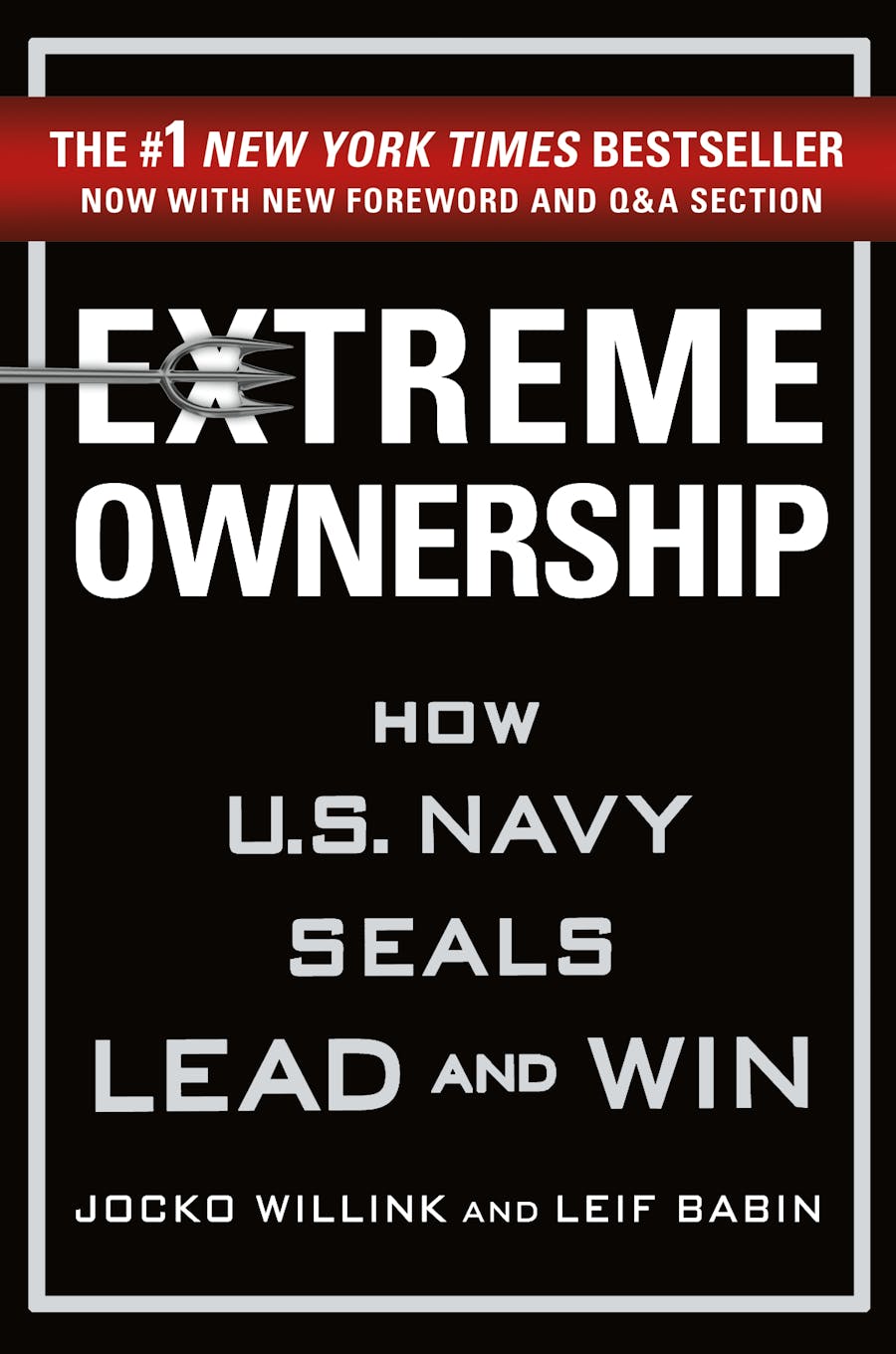Extreme Ownership by Jocko Willink, Leif Babin

(New York: St. Martin's Press, 2017-11-21), 320
Notes
Contents
Foreword
- "Of the many exceptional leaders we served alongside throughout our military careers, the consistent attributed that made them great was that they took absolute ownership—Extreme Ownership—not just of those things for which they were responsible, but for everything that impacted their mission." (xi)
- "Once people stop making excuses, stop blaming others, and take ownership of everything in their lives, they are compelled to take action to solve their problems." (xii)
- "Leadership is the most important thing on the battlefield, and the principles of good leadership do not change regardless of the mission, the environment ,or the personalities of those involved. Leading is leading." (xiv)
Introduction—Leadership: The Single Most Important Factor
- "The only meaningful measure for a leader is whether the team succeeds or fails...Effective leaders lead successful teams that accomplish their mission and win. Ineffective leaders do not." (8)
Part I: Winning the War Within
Chapter 1: Extreme Ownership
- All responsibility for success and failure rests with the leader. The leader must own everything in his or her world.
- The leader must takeExtreme Ownership of everything that impacts their mission.
Chapter 2: No Bad Teams, Only Bad Leaders
- There are no bad teams, only bad leaders. (49)
- Leadership is the single greatest factor in any team's performance. Whether a team succeeds or fails is all up to the leader. The leader's attitude sets the tone for the entire team.
- "It's not what you preach, it's what you tolerate" (54)
- "Leaders should never be satisfied. They must always strive to improve." (55)
Chapter 3: Believe
- A leader must be a true believer in the mission. Otherwise he will not take the risks required to overcome the inevitable challenges nor be able to convince others to do so (76)
- A leader must be able to detach from the immediate tactical mission and understand how it fits into strategic goals (77)
- A leader must ask questions until he understands the mission, and take the time to explain and answer questions from subordinates so they do so as well (77)
Chapter 4: Check the Ego
- Extreme Ownership requires checking your ego and operating with a high degree of humility (100)
- We must never get complacent (101)
Part II: Laws of Combat
Chapter 5: Cover and Move
- Cover and move means teamwork (121)
- "Departments and groups within the team must break down silos, depend on each other, and understand who depends on them. If they forsake this principle and operate independently or work against each other, the results can be catastrophic to the overall team's performance." (122, cf STO Pitfalls)
- If the overall team fails, everyone fails. The focus must always be on how to best accomplish the mission (122)
Chapter 6: Simple
- Simplifying as much as possible is crucial to success; Complexity compounds issues (140)
- Everyone on the tam must know their role and what to do in the event of likely contingencies
- If your team doesn't get it, you have not kept things simple and you have failed
Chapter 7: Prioritize and Execute
- Prioritize and Execute: "Relax, look around, make a call" (161)
- Determine the highest priority task and execute: when priorities shift clearly communicate that to the rest of the team (162)
Chapter 8: Decentralized Command
- Leaders must make known their commander's intent and then empower junior leaders to make decisions (183)
- Tactical leaders must understand not just what to do, but why they are doing it.
- Leaders must push situational awareness down to their subordinates and up to their leaders (184)
Part III: Sustaining Victory
Chapter 9: Plan
- Planning begins with the mission analysis, or Working Backwards from the end state.
Delegate planning, brief to the entire team, mitigate risks where possible
Chapter 10: Leading Up and Down the Chain of Command
First look in the mirror and blame yourself rather than blaming your boss (237)
- Push situational awareness up to your boss, and ask questions
Chapter 11: Decisiveness amid Uncertainty
- There is no 100 percent right solution. Be comfortable with this and be able to make decisions promptly and then adjust them as you get new information (254)
Chapter 12: Discipline Equals Freedom—The Dichotomy of Leadership
- Just as discipline and freedom are opposing force that must be balanced, leadership requires finding the equilibrium in the dichotomy of many seemingly contradictory qualities (274)
- A good leader has nothing to prove, but everything to prove (278)
Afterword
- Extreme Ownership is an attitude (286)
- The goal of all leaders is to work themselves out of a job → training and mentorship
- Leadership is simple but not easy
- Leading people is the most challenging and, therefore, the most gratifying undertaking of all human endeavors (287)
Topic: Leadership
Source
- UA Library (when searching for Working Backwards)
- Dad 2023-08-23-Wed
Created: 2023-06-04-Sun
Updated: 2024-01-30-Tue